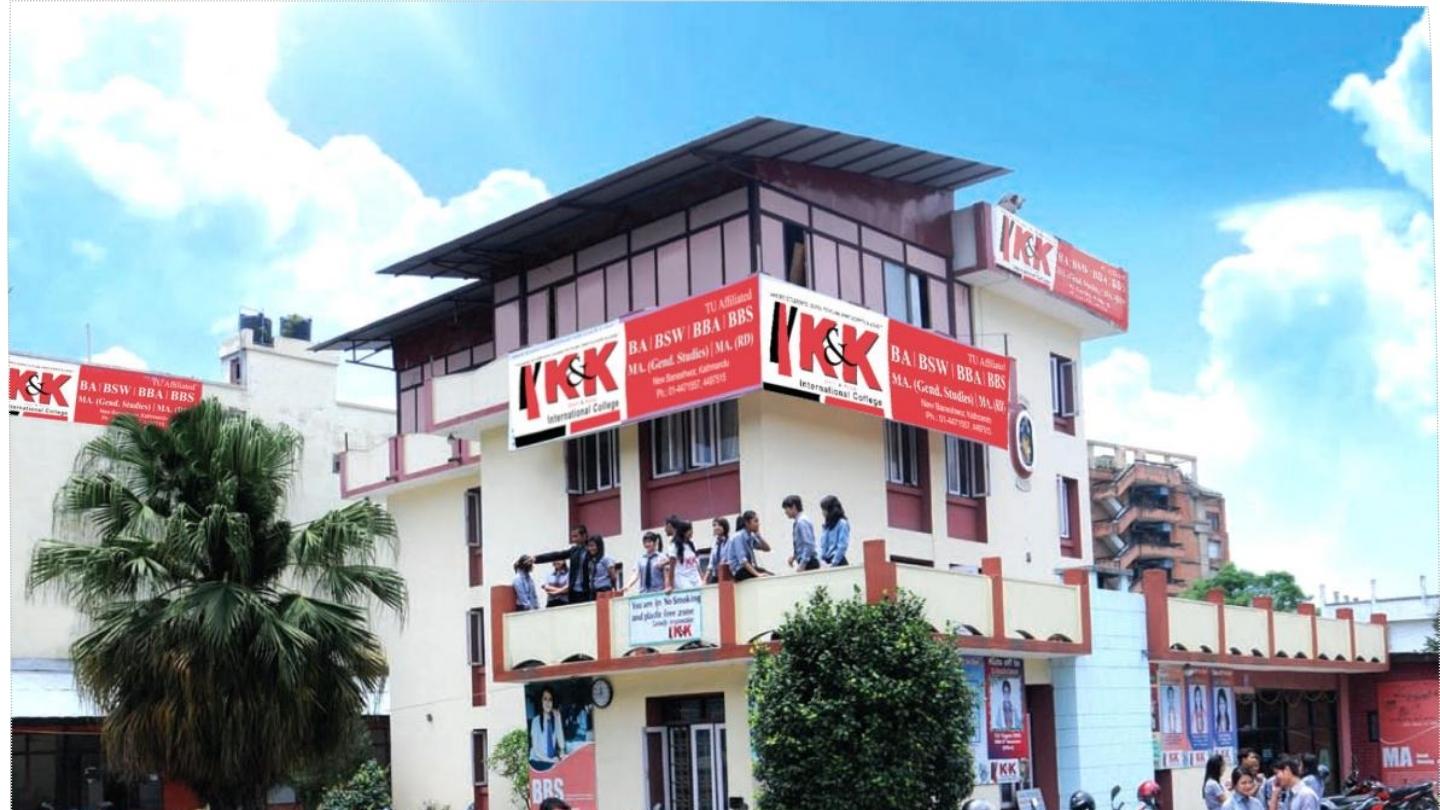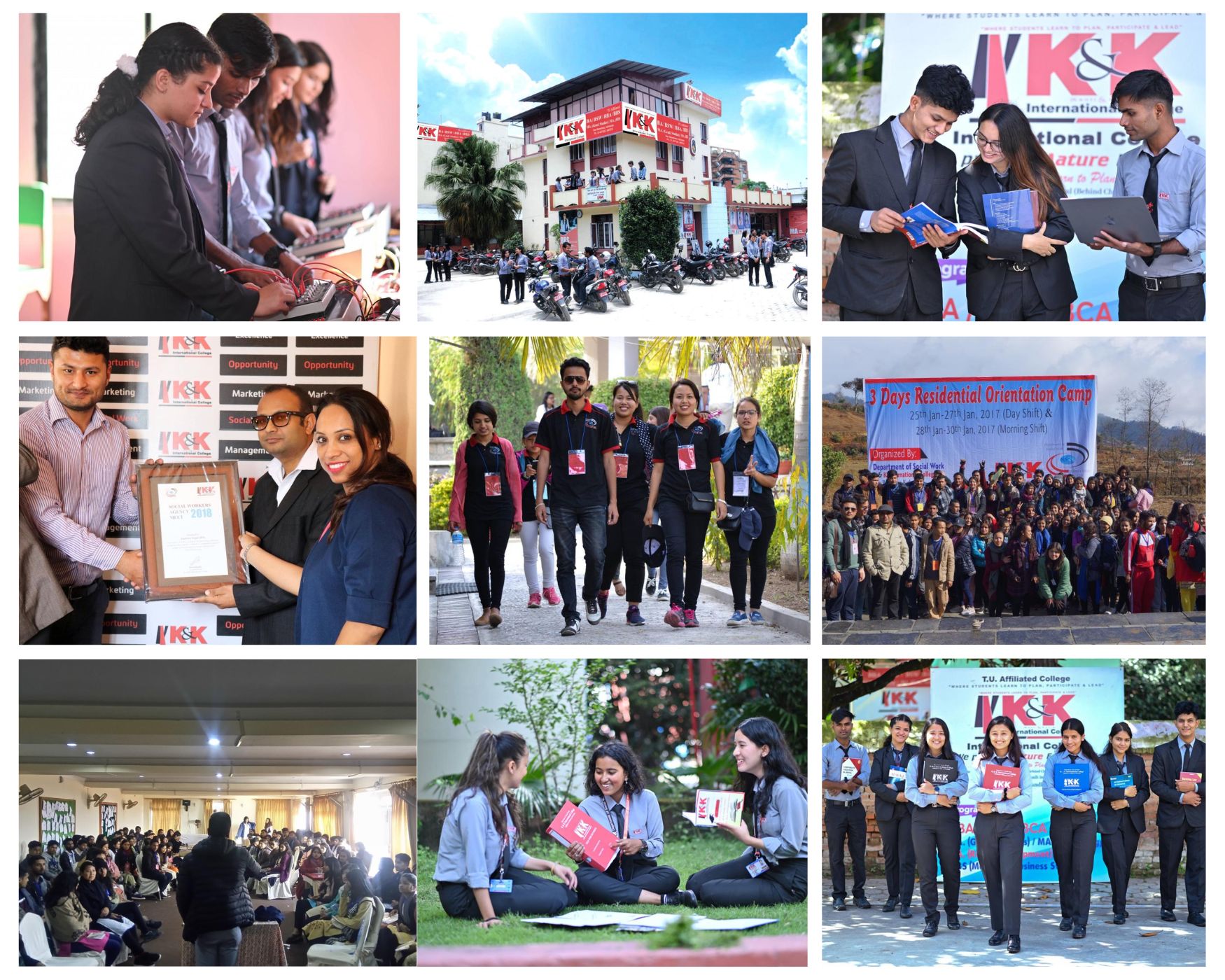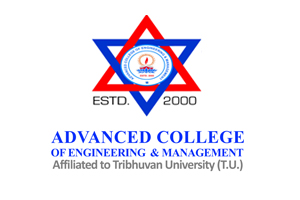Overview
K & K International College (K&K), located in New Baneshwor, Kathmandu, is a Tribhuvan University–affiliated institution offering undergraduate and graduate programs in management, information technology, and the social sciences. The college emerged from the merger of Kantipur College of Business, Management and Humanities Studies (KCBMHS) and Knowledge & Wisdom Academy, with a shared motto “Plan, Participate and Lead.” (Kanti and Kunja International College) K&K’s College is located opposite the International Convention Centre (BICC) with convenient public transport access.
K & K International College, New Baneshwor, Kathmandu, affiliated with Tribhuvan University, offers programs such as BBA, BBS, BCA, BASW, BA Psychology, BA Gender Studies, BA Rural Development; master’s programs MBS, MA Psychology (Clinical), MA Gender Studies, and MA in Rural Development Studies (MRDS). These programs are offered under TU’s Faculty of Management (FoM) and Faculty of Humanities & Social Sciences (FoHSS).

Quick Highlights
-
Established/Origins: K&K is the outcome of a merger between KCBMHS (est. 1998) and Knowledge & Wisdom Academy.
-
Affiliation: Tribhuvan University (FoM and FoHSS).
-
Location: New Baneshwor, Kathmandu (opposite BICC); easily reachable from Patan and Bhaktapur.
-
Motto: “Plan, Participate and Lead.”
-
Undergraduate programs (TU): BBA, BBS, BCA, BA in Social Work (BASW), BA in Psychology (BAPSY), BA in Gender Studies (BAGS), BA in Rural Development (BARD).
-
Graduate programs (TU): MBS, MA in Psychology, MA in Gender Studies, MA in Rural Development Studies (MRDS).
-
Key entrance points: CMAT for BBA as per TU FoM (minimum 40/100). BCA follows FoHSS curriculum with 126 total credits. Other BA majors and MAs follow FoHSS rules and college notifications.
Overview
K&K serves students seeking management, IT, and social-science degrees under Tribhuvan University. The college’s identity—born from two institutions—supports a portfolio that includes practice-oriented management courses, an IT-focused BCA, and BA/MA options in social work, psychology, gender studies, and rural development.
The location in New Baneshwor benefits daily commuters and out-of-valley applicants who need reliable routes across Kathmandu’s core. The academic approach aligns each program with TU’s official syllabi and evaluation norms—FoM for BBA/BBS/MBS and FoHSS for BCA, BA majors, and MAs.
Academic Programs Offered
Undergraduate (TU)
Bachelor of Business Administration (BBA)
The Bachelor of Business Administration (BBA) under Tribhuvan University’s Faculty of Management is a four-year, eight-semester program that builds a clear path from fundamentals to application. Admission requires the CMAT entrance test, and candidates must score at least 40 out of 100 to qualify for further selection.
Early semesters cover accounting, economics, business math, statistics, and communication. Later semesters move into finance, marketing, operations, and human resources, supported by case work, presentations, team assignments, and projects that link classroom learning with real contexts. Assessment, course order, credit loads, and graduation rules follow the TU FoM BBA curriculum and its published evaluation standards.
Bachelor of Business Studies (BBS)
The BBS at K&K follows Tribhuvan University’s Faculty of Management framework for a four-year degree. TU’s standardized syllabi guide the sequence of courses in management, accounting, finance, marketing, and business research, culminating in a final project.
Colleges use the same course codes, evaluation methods, and examination norms across the network, so learning outcomes remain consistent. Students advance from foundation subjects to applied areas and research tools, then complete a project that demonstrates basic inquiry, data handling, and reporting skills. K&K delivers the program in line with TU’s updated annual/semesterized structure.
Bachelor of Computer Application (BCA)
BCA is a four-year, 126-credit program under TU’s Faculty of Humanities and Social Sciences. The official syllabus covers computing fundamentals, programming, databases, networking, web technologies, software engineering, professional ethics, and an internship.
Learning is hands-on through labs, programming tasks, and staged capstone projects that build from simple problem-solving to small applications. K&K notes lab access and learning resources that support project work and online materials. Graduates leave with an applied portfolio and familiarity with TU’s evaluation system across theory papers, practicals, internal assessments, and project reviews.
BASW — Bachelor of Arts in Social Work
BASW is a four-year FoHSS program that combines classroom study with compulsory fieldwork defined by TU’s curriculum. Students learn core concepts of social work, basic research, and community engagement, then apply them through placements with registered organizations. Field hours, supervision meetings, and structured reports are part of the assessment.
Typical tasks include client observation, simple case notes, community mapping, and participation in outreach events. The blend of theory and practice helps students relate policy and ethics to day-to-day service settings while meeting TU’s documentation and evaluation requirements.
BA in Psychology
The BA in Psychology is a four-year FoHSS major built around seven core papers plus associated coursework specified by TU’s Curriculum Development Centre. Core areas introduce students to behavior and mental processes, including topics such as cognition, development, personality, social behavior, and basic research skills.
Teaching usually combines lectures, short assignments, and practical demonstrations where applicable. As students progress, they learn to read research summaries, interpret simple data, and present short reports. Assessment follows TU’s guidelines for written exams and internal work, ensuring consistency across affiliated colleges.
BA in Gender Studies
K&K offers Gender Studies within the FoHSS BA structure, where students select two majors plus electives under TU rules. The major explores how gender relates to family, work, education, media, and public policy in Nepal and beyond. Coursework encourages clear reading and discussion of key concepts, short response papers, and basic field observations when assigned. Students also learn introductory research approaches used in the social sciences.
Evaluation follows TU’s standard model for BA programs, combining internal assessments and examinations while keeping alignment with the published FoHSS curriculum.
BA in Rural Development
The BA in Rural Development is a FoHSS major that engages with local governance, livelihoods, community organizations, and basic planning approaches. TU’s department and downloads section provide the current four-year outlines that replaced older three-year versions.
Students move from background concepts to Nepal-focused cases, reading brief policy documents and attempting simple field tasks where assigned. Typical assessments include short essays, presentations, and basic data descriptions tied to rural issues. Colleges follow TU’s course sequence and evaluation norms so that outcomes remain consistent across affiliated campuses.
Graduate (TU)
MBS — Master of Business Studies
The MBS at Tribhuvan University runs for two years across four semesters. Students complete core courses in managerial economics, accounting, finance, marketing, operations, and research methods before choosing a specialization (such as finance or marketing) and preparing a dissertation under faculty supervision. Assessment combines internal work and semester-end exams, with the dissertation demonstrating the ability to define a problem, review literature, apply basic analytical tools, and report findings clearly. The structure follows TU FoM rules, so course codes, evaluation, and learning outcomes remain consistent across affiliated colleges.
MA in Psychology
This four-semester program under TU’s Faculty of Humanities and Social Sciences builds a pathway from theory to supervised practice. Students study advanced psychology, psychometrics, assessment, and counseling/psychotherapy, then complete practicum placements and a thesis. Typical activities include test administration, case formulation, brief intervention plans, and reflective logs under supervision.
Internal assessments weigh attendance, assignments, and practical records, while semester exams cover core papers. The clinical track at K&K follows TU FoHSS requirements, giving graduates documented exposure to assessment tools, basic therapeutic frameworks, and applied research within the university’s guidelines.
MA in Gender Studies
The MA in Gender Studies is organized in four semesters with a thesis at the end, as per TU FoHSS. Coursework examines gender in family, work, media, health, and policy, with attention to Nepal’s legal and institutional context. Methods papers introduce qualitative and quantitative approaches, ethics, and small field assignments.
Students read key texts, prepare short reviews, and practice data interpretation relevant to gender analysis. The department and FoHSS pages publish syllabi and notices each intake, helping applicants track course lists, examination schedules, and thesis procedures that apply across affiliated campuses.
MA in Rural Development Studies (MRDS)
MRDS is a two-year master’s focused on rural development theory, local governance, planning, project management, environment, and research. Across four semesters, students engage with policy frameworks, community organizations, and planning tools suited to Nepal’s rural settings. Assignments may include rapid appraisals, simple survey design, and short project plans linked to local issues.
The final thesis asks students to define a practical research question, gather data ethically, and present clear findings. The program follows TU FoHSS/CDRD materials, so course outlines, evaluations, and thesis steps align with the university’s published requirements.
Admission Process
Step 1 — Program selection & eligibility
Check program-wise eligibility on K&K’s official pages and TU faculty rules. Management programs follow FoM; social sciences and BCA follow FoHSS.
Step 2 — Entrance (as applicable)
-
BBA: TU FoM CMAT, qualifying 40/100 minimum, followed by college-level assessment processes set by TU norms.
-
BCA: FoHSS program; admissions run per FOHSS notices and college communications.
-
BA majors (BASW, Psychology, Gender Studies, Rural Development): follow FoHSS frameworks; some departments may require screening/interviews as notified locally.
-
MBS / MA programs: follow FoM/FoHSS semester rules, departmental instructions, and college calls for applications.
Step 3 — Documents & application
Applicants typically submit academic transcripts/grades, identity documents, and passport-size photos; follow K&K’s intake notices for dates, seats, and any additional steps.
Teaching Faculty and Learning Methodology
K&K’s stated academic ethos highlights planned coursework, participation, and student leadership, reflected in class activities such as case discussions, presentations, and guided projects.
-
Management (BBA/BBS/MBS): Follows FoM syllabi with classroom lectures, assignments, presentations, and research components per semester/annual guidelines.
-
BCA: Lab-intensive delivery with staged projects (Project I–III) consistent with the 126-credit FOHSS design.
-
Social Sciences (BASW, Psychology, Gender Studies, Rural Development; MA tracks): Mix of lectures, seminars, fieldwork/practicum (especially in BASW and MRDS), and thesis at master’s level.
Infrastructure and Learning Facilities
-
Library & study resources: The college reports a library with print and digital materials, networked terminals, and reading spaces for students and faculty.
-
Computer lab: Dedicated lab support for BCA and management IT modules; internet access supports online resources and project work.
-
Classrooms: Multimedia-enabled teaching spaces for lectures and presentations.
-
Cafeteria: On-site cafeteria with regular service for students and staff.
Student Life and Campus Experience
-
Student clubs and activities: K&K states it runs clubs and an activity calendar that encourage participation and interpersonal growth.
-
Sports & recreation: Scheduled access to indoor and outdoor games (e.g., table tennis, basketball, cricket, football/futsal, badminton), as noted on college pages.

Extracurricular Activities (ECA)
-
Academic events: Guest talks, workshops, and presentations are organized within departments as part of coursework and semester routines.
-
Community exposure: BASW fieldwork and MRDS field components naturally extend learning beyond classrooms under TU course requirements.
Scholarships and Financial Support
KnK’s program pages mention merit-oriented and deserving-student scholarship provisions administered by departments/management. Program-specific scholarships (where available) follow published criteria and TU norms; applicants should confirm current schemes during admission.
Achievements and Institutional Milestones
-
Institutional consolidation (1998 onward): Formation through KCBMHS and Knowledge & Wisdom Academy, setting up a pathway to run both management and social-science programs under TU.
-
Program breadth: Undergraduate to postgraduate offerings across FoM and FoHSS—including BCA 126-credit structure (FoHSS) and MBS with core/specialization/dissertation (FoM)—indicate horizontal and vertical progression for students.
-
Location advantage: New Baneshwor site opposite BICC supports daily commute and institutional engagement.
Why Choose K&K College?
-
TU-aligned degrees across disciplines: Single campus with FoM (BBA, BBS, MBS) and FoHSS (BCA, BASW, Psychology, Gender Studies, Rural Development; MA tracks).
-
Structured curricula you can verify: Clear, published syllabi for each program via TU faculties and departments.
-
Practical exposure where it counts: BCA projects; BASW fieldwork; MRDS field components; thesis at master’s level per TU rules.
-
Central location: Easy access in New Baneshwor for students across the valley.
Message from the Leadership
Chairman’s Message
Education should sharpen thinking and judgment. At K&K, we ask you to read widely, question ideas, and practice honest work. Our motto—Plan, Participate, Lead—begins with small habits: arrive prepared, contribute in class, finish tasks on time, and lend a hand when a peer needs support. Use the library, labs, and clubs; keep a steady study routine; reflect on feedback and adjust. Do the basics well and progress follows. — Ichchha Bahadur Wagle, Chairman.
Director’s Message
A strong degree grows from attendance, steady study, and timely feedback. Follow your course plan, keep clear notes, and meet deadlines. Visit office hours and writing support when you need help, and use the computer lab to practice. In field-based courses, maintain a simple log and submit neat reports. Before exams, review past questions and discuss weak areas with teachers. Watch notices for scholarships, internships, and workshops; join one club and stay active. Learn consistently and keep your work verifiable. — Kiran Bhattarai, Administrative Director.
Conclusion
K & K International College offers a concise route for students who want TU-accredited qualifications in management, computing, and social sciences from a single Kathmandu location. With programs that map to FoM and FoHSS syllabi—including BBA/BBS/MBS, BCA, and BA/MA options in social work, psychology, gender studies, and rural development—K&K provides pathways from entry to postgraduate study.
Frequently Asked Questions (FAQs)
1) Is K&K affiliated with Tribhuvan University?
Yes. Programs run under TU’s Faculty of Management and Faculty of Humanities & Social Sciences.
2) What is the CMAT requirement for BBA at TU?
TU FoM requires CMAT and sets 40/100 as the qualifying minimum; colleges then follow their selection processes within TU rules.
3) How is BCA structured under TU?
The FOHSS BCA is a four-year, 126-credit program covering core computing, projects, internship, and professional practice.
4) Does BASW include fieldwork?
Yes. The TU BASW curriculum includes compulsory fieldwork and reporting alongside theory courses.
5) What is the duration of MBS and how is it assessed?
MBS is a two-year, four-semester program with core courses, specialization, and a dissertation per FoM.
6) Which BA majors are available at K&K?
College pages list Psychology, Social Work, Gender Studies, and Rural Development among BA options. Check current intake notices each year.
7) Where is the campus located?
New Baneshwor, opposite the International Convention Centre (BICC), accessible from major city points.
8) Are scholarships available?
Program pages indicate scholarships for deserving students per departmental/management criteria; confirm at admission.
Contact K and K International College's administrative office for detailed information on the course, admissions, location, fees, scholarships, facilities, counseling, or eligibility.
Contact Details
K and K International College
Email Address: kandkinternationalcollege@kandk.edu.np
Phone Number: +977-1-4597515 +977-1-4574557 +977-9865072931, +977-9860509203, +977-9818363716, +977-9843873446, +977-9860407130
Website: https://kandk.edu.np
Location: New Baneshwor (In front of BICC, West Gate-2), Kathmandu, Nepal



















You need to login to comment.